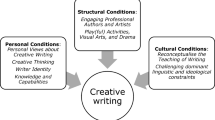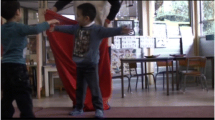Abstract
Most academic science educators encourage teachers to provide their students with access to more authentic science activities. What can and do teachers say to increase students’ interests in participating in opportunities to do real science? What are the discursive resources they draw on to introduce authentic science to students? The purpose of this ethnographic and discourse-analytic study is to investigate the ways in which the activities of scientists are discursively presented to high school students in a biology/career preparation course. Data sources were collected by means of observation, field notes, interviews, and videotaped lessons in an eleventh-grade biology/career preparation course. Drawing on discourse analysis, we investigate the discursive resources—or, more specifically and technically, the interpretative repertoires—teachers used to explain and promote opportunities to engage students in real science activities. Our analysis identifies and characterizes six types of interpretative repertoires: specialized, a-stereotypical, relevant, empirical, emotive, and rare-opportunity. To better understand the “big picture” of how these discursive resources are drawn on in the classroom, we also report on the frequencies of the repertoires in the discourse and the ways in which repertoires changed in the course of teacher-student interactions. The findings of this case study offer teachers and researchers with a better understanding of how specific forms of discourse—i.e., the repertoires—can serve as resources to enhance teacher-introduction of authentic science to students and provide students a bridge between school and authentic science.

Similar content being viewed by others
Notes
Basic notations of transcription: “bracket” indicate the start and end points of overlapping speech; “period” indicates falling pitch or intonation; “question mark” indicates rising pitch or intonation; “comma” indicates a temporary rise or fall in intonation; “capitalized text” indicates shouted or increased volume speech; “underlined text” indicates the speaker is emphasizing or stressing the speech; “colon(s)” indicates prolongation of a sound; “h inside single parentheses” indicates audible exhalation; “text in double parentheses” indicates annotation of non-verbal activity.
References
Atkinson, J. M., & Heritage, J. (Eds.) (1984). Structures of social action: Studies in conversation analysis. Cambridge: Cambridge University Press.
Bakhtin, M. M. (1986). Speech genres and other late essays. Austin: University of Texas Press.
Bell, R., Blair, L., Crawford, B., & Lederman, N. (2003). Just do it? The impact of a science apprenticeship program on high school students’ understandings of the nature of science and scientific inquiry. Journal of Research in Science Teaching, 40, 487–509. doi:10.1002/tea.10086.
Bencze, L., & Hodson, D. (1999). Changing practice by changing practice: Toward more authentic science and science curriculum development. Journal of Research in Science Teaching, 36, 521–539. doi:10.1002/(SICI)1098-2736(199905)36:5<521::AID-TEA2>3.0.CO;2-6.
Cunningham, C. M., & Helms, J. V. (1998). Sociology of science as a means to a more authentic, inclusive science education. Journal of Research in Science Teaching, 35, 483–500. doi:10.1002/(SICI)1098–2736(199805)35:5<483::AID-TEA2>3.0.CO;2-L.
Edley, N. (2001). Analysing masculinity: Interpretative repertoires, ideological dilemmas and subject positions. In M. Wetherell, S. Taylor, & S. Yates (Eds.), Discourse as data: a guide for analysis (pp. 189–229). London: Sage Publications.
Edwards, D., & Potter, J. (1992). Discursive psychology. London: Sage.
Fox-Keller, E. (1983). A feeling for the organism. New York: W. H. Freeman.
Gilbert, N., & Mulkay, M. (1984). Opening Pandora’s box: A sociological analysis of scientists’ discourse. Cambridge: Cambridge University Press.
Guba, E., & Lincoln, Y. (1989). Fourth generation evaluation. Beverly Hills, CA: Sage.
Holzkamp, L. (1993). Lernen: Subjektwissenschaftliche Grundlagen. Frankfurt: Campus-Verlag.
Lee, Y. J., & Roth, W.-M. (2004). Making a scientist: Discursive “doing” of identity and self-presentation during research interviews. Forum Qualitative Sozialforschung/Forum: Qualitative Social Research, 5(1). http://www.qualitative-research.net/fqs-texte/1-04/1-04leeroth-e.htm. (Accessed August 21, 2007)
Lee, H.-S., & Songer, N. B. (2003). Making authentic science accessible to students. International Journal of Science Education, 25, 923–948. doi:10.1080/09500690305023.
Lemke, J. L. (1990). Talking science: Language, learning and values. Norwood, NJ: Ablex.
Martin, B., Kass, H., & Brouwen, W. (1990). Authentic science: A diversity of meanings. Science Education, 74, 541–554. doi:10.1002/sce.3730740505.
National Research Council (1996). National science education standards. Washington, DC: National Academy Press.
Potter, J. (1996). Discourse analysis and constructionist approaches: Theoretical background. In J. E. Richardson (Ed.), Handbook of qualitative research methods for psychology and the social sciences (pp. 125–140). Leicester: British Psychological Society.
Potter, J. (2003). Discourse analysis and discursive psychology. In P. M. Camic, J. E. Rhodes, & L. Yardley (Eds.), Qualitative research in psychology: Expanding perspectives in methodology and design (pp. 73–94). Washington: American Psychological Association.
Potter, J., & Wetherell, M. (1987). Discourse and social psychology: Beyond attitudes and behaviour. London: Sage.
Potter, J., & Wetherell, M. (1995). Discourse analysis. In J. Smith, R. Harré, & R. van Langenhove (Eds.), Rethinking methods in psychology (pp. 80–92). London: Sage.
Rahm, J., Miller, H. C., Hartley, L., & Moore, J. C. (2003). The value of an emergent notion of authenticity: Examples from two student/teacher science partnerships programs. Journal of Research in Science Teaching, 40, 737–756. doi:10.1002/tea.10109.
Reis, G., & Roth, W.-M. (2007). Environmental education in action: A discursive approach to curriculum design. Environmental Education Research, 13, 307–327. doi:10.1080/13504620701430356.
Roth, W.-M. (2005). Doing qualitative research: Praxis of methods. Rotterdam: SensePublishers.
Roth, W.-M. (2008). The nature of scientific conceptions: A discursive psychological perspective. Educational Research Review, 3, 30–50
Roth, W.-M., & Alexander, T. (1997). The interaction of students’ scientific and religious discourses: Two case studies. International Journal of Science Education, 19, 125–146. doi:10.1080/0950069970190201.
Roth, W.-M., & Bowen, G. M. (1995). Knowing and interacting: A study of culture, practices, and resources in a grade 8 open-inquiry science classroom guided by a cognitive apprenticeship metaphor. Cognition and Instruction, 13, 73–128. doi:10.1207/s1532690xci1301_3.
Roth, W.-M., & Boyd, N. (1999). Coteaching, as colearning, in practice. Research in Science Education, 29, 51–67. doi:10.1007/BF02461180.
Roth, W.-M., & Lucas, K.-B. (1997). From ‘truth’ to ‘invented reality’: A discourse analysis of high school physics students’ talk about scientific knowledge. Journal of Research in Science Teaching, 34, 145–179. doi:10.1002/(SICI)1098-2736(199702)34:2<145::AID-TEA4>3.0.CO;2-T.
Roth, W.-M., Lee, Y. J., & Hwang, S.-W. (2008). Culturing conceptions: From first principles. Cultural Studies of Science Education, 3, 231–261.
Roth, W.-M., Lucas, K. B., & McRobbie, C. (2001). Students’ talk about rotational motion within and across contexts and teacher awareness. International Journal of Science Education, 23, 151–179.
Soloway, E., Pryor, A. Z., Krajcik, J. S., Jackson, S., Stratford, S. J., Wisnudel, M., et al. (1997). ScienceWare’s Model-It: Technology to support authentic science inquiry. The Journal, 25, 54–56.
Unsworth, L. (2000). Researching language in schools and communities: SFL perspectives. London and Washington: Cassell.
Unsworth, L. (2001). Teaching multiliteracies across the curriculum: Changing contexts of text and image in classroom practice. Buckingham: Open University Press.
Uyeda, S., Madden, J., Brigham, L. A., Luft, J. A., & Washburne, J. (2002). Solving authentic science problems: Problem-based learning connects science to the world beyond school. Science Teacher (Normal, Ill.), 69(1), 24–29.
Acknowledgments
This work has been supported in part by the Centre for Research in Youth, Science Teaching and Learning (CRYSTAL) grant from the Natural Sciences and Engineering Research Council of Canada (to W.-M. Roth, PI). The study is based on P-L. Hsu’s doctoral dissertation (Chapter 4). We appreciate participants’ participations in the study and comments from colleagues Diego Machado Ardenghi, Leanna Boyer, Peilan Chen, Michiel W. van Eijck, Gholamreza Emad, Maria Ines Mafra Goulart, Francis Guenette, SungWon Hwang, Bruno Jayme, Mijung Kim, Jean François Maheux, Anne Marshall, Asit Mazumder, Lilian Pozzer-Ardenghi, Giuliano Reis, Eduardo Sarquis Soares, and Ian Stith. The authors take responsibility for the contents.
Author information
Authors and Affiliations
Corresponding author
Rights and permissions
About this article
Cite this article
Hsu, PL., Roth, WM. An Analysis of Teacher Discourse that Introduces Real Science Activities to High School Students. Res Sci Educ 39, 553–574 (2009). https://doi.org/10.1007/s11165-008-9094-9
Received:
Accepted:
Published:
Issue Date:
DOI: https://doi.org/10.1007/s11165-008-9094-9




